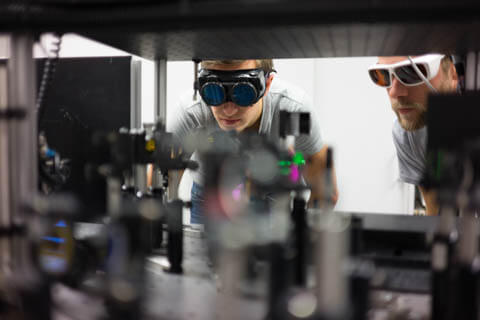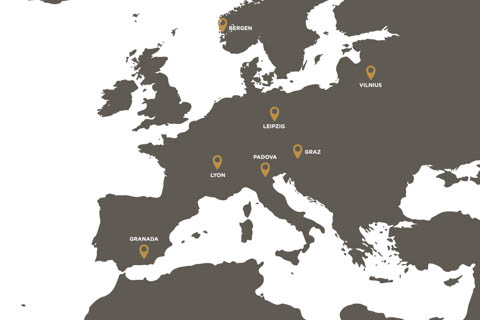 |
Faculty
Faculty of Physics
|
|

|
Scope of studies and length
240 ECTS credits, 4 years |
|

|
Qualification awarded
Bachelor in Technological Sciences |
|

|
Application deadline*
1 May / 1 July |
|

|
Language
English |
|

|
Tuition fee per year
4 600 € for non-EU students
4 108 € for EU students
|
|

|
Start of studies
1 September
|
 |
City
Vilnius |
APPLY NOW
The objective of the Light Engineering study programme is to achieve a fundamental knowledge of physics, chemistry and mathematics, as well as an applied understanding of material synthesis and characterisation, the operation principles of lasers, photovoltaic and light-emitting devices, and finally, to develop and train students in the practical technological and engineering skills needed for work with lasers, laser technologies, modern lighting, photovoltaics, photonics, and semiconductor industries and enterprises.
Programme structure
| Course unit title |
ECTS
credits
|
|---|
| Course unit title |
ECTS
credits
|
|---|
|
1 semester
Compulsory courses
Computers Literacy for Physicists
General Physics I/IV p.
Higher Mathematics I/II p.
Linear Algebra
Study Skills
|
30.0
5.0
10.0
5.0
5.0
5.0
|
|
2 semester
Compulsory courses
General Physics II/IV p.
Higher Mathematics II/II p.
Numerical Methods I/II p.
Technical Drawing
|
30.0
10.0
10.0
5.0
5.0
|
|
3 semester
Compulsory courses
Applied Electronics I/II p.
General Physics III/IV p.
Numerical Methods II/II p.
Quantum Mechanics
Visual Programming and
Computerised Measurements
|
30.0
5.0
10.0
5.0
5.0
5.0
|
|
4 semester
Compulsory courses
Fundamentals of Chemistry
General Physics IV/IV p.
Lasers
Optoelectronics
Solid State Physics
Elective courses (5 ECTS)
Applied Electronics II
Functional and Smart Materials
|
25.0
5.0
5.0
5.0
5.0
5.0
5.0
5.0
|
|
5 semester
Compulsory courses
Laser Technology
Organic Optoelectronics
Semiconductors Growth Technologies
Solar Energy and Photovoltaics
Elective courses (5 ECTS)
Optical Spectroscopy
Modern Illumination Technologies and
Light Design
General Education Modules
|
20.0
5.0
5.0
5.0
5.0
5.0
5.0
5.0
|
|
6 semester
Compulsory courses
Materials Characterization Techniques
Metrology of Light Sources and Components
Optical System Design
Optoelectronics II/II p.
Elective courses (5 ECTS)
Fiber Technology
Nano- and Microstructure Technologies
General Education Modules
|
20.0
5.0
5.0
5.0
5.0
5.0
5.0
5.0
|
|
7 semester
Compulsory courses
Lasers Engineering
Practical Training
Research and Innovation Management
General Education Modules
|
25.0
5.0
15.0
5.0
5.0
|
|
8 semester
Compulsory courses
Bachelor Final Thesis
(Study field: Materials Technology)
Optomechanics
Project Management
|
30.0
20.0
5.0
5.0
|
Key Learning Outcomes
Having completed the Light Engineering programme, a graduate will have acquired professional the competencies needed to carry out complex work that requires a fundamental knowledge of physics, chemistry and mathematics, as well as an applied understanding of material synthesis and characterisation, the operation principles of lasers, photovoltaic and light emitting devices, and practical skills in programming, general lighting design and standard laboratory procedures. Our graduates have technological skills and engineering competencies in the following high-tech fields: understanding optical system operations, analysis and development; knowledge of the operating principles of semiconductor electronic and optoelectronic devices; understanding of material synthesis and knowledge of the technological processes; understanding of the principles of the operation of modern lasers; and knowledge of modern digital modelling techniques, as well as the software required for process automation and control.
Programme Specific Requirements
- The grades in Physics, Mathematics shall not be lower than 55 per cent of the maximum possible grade.
- The candidates meeting the established criteria are invited to the motivational interview. During the interview, the candidate’s determination to study in the technology field study programme based on experimental works is evaluated. If the interview is evaluated negatively, the candidate is not admitted to the study programme.
In addition, all applicants have to fulfil the general admission requirements.
Why choose this programme?
- Light Engineering is a programme with no close rivals at neighbouring universities within the Baltic region. It combines a practice-oriented approach with shorter studies focused on light technologies, which is among the best developed and fastest-growing high-tech fields in Lithuania.
- Most of the Light Engineering courses are taught by leading Lithuanian professors and scientists who are active in this field.
- The programme offers a unique opportunity to learn practical skills using the modern growth and characterisation equipment available at the National Centre for Physical Sciences and Technology.
|
What comes after?
- Graduates of the programme will have acquired the knowledge and competencies needed to pursue a career in the light technology industry in Lithuania or abroad.
- They will also be able to continue their studies at the Master’s and PhD levels. The nearest postgraduate subjects include laser physics and optical technology, laser technology, material science and semiconductor physics, as well as optoelectronic materials and technologies.
|
|
„This programme is really promising for both students and employers because of the wide diversity of skills it provides. It is nice that the programme allows the students to choose between the going deeper into one of specific optoelectronics field or gaining wider, but more basic all-around knowledge. The combination of practice and theory opens ways for both scientific and engineering work.“
Marijus Ambrozas, a student from Lithuania
|


